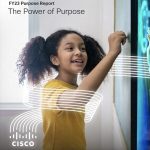This post originally appeared in Latino Leaders Magazine in December 2016.
Laura joined Cisco in 1999 and currently leads the company’s Corporate Social Responsibility (CSR) field operations worldwide. She and her team, based in 40 countries, help shape and drive public-private partnerships to design, implement and operate strategic CSR programs in the areas of IT education and economic empowerment in 170 countries around the world.
These programs reach well over one million beneficiaries each year with annual in-kind contributions valued at over $240M USD. Laura holds a Bachelor of Science degree in engineering from Stanford University and lives in the San Francisco Bay Area with her husband and their three children.
What was given to you in terms of advice or mentorship that pushed you to where you are today?
The best advice I ever received was from my mom. She passed away 21 years ago, but the values she taught me are still with me. My parents immigrated as adults to the US from Mexico and my mother never studied past middle school because she had to go to work at an early age. She did not speak English well and never learned to drive so I was her primary interpreter and we took public transportation everywhere together.
I was extremely close to her growing up. She encouraged me to soar by emphasizing the value of education and the importance of working hard to achieve your goals, and always told me that “querer es poder” (where there is a will there is a way) and “nadie te puede quitar tu educación” (no one can take away your education). She also taught me to treat everyone with respect and dignity, and if I ever strayed from this, she was quick to put me in my place.
Thanks to her guidance I was the first in my family to go to college and studied engineering at Stanford. Even today, I look at every big challenge as an opportunity to learn something new and to make an impact.
What are your most important work and professional values?
To have a career where I can provide leadership and work with people and teams in a challenging and exciting environment (I get bored easily); to provide value that is appreciated by others; to do work that feeds my soul and benefits people and their communities.
I feel very fortunate to be working at Cisco, within a culture that enables teams to thrive, and in a position where my team positively impacts over 1 million students annually.
What is it like being a woman in the IT field?
There’s never been a better time for women in technology! As a woman, Latina, and mother of three children, I’ve had a wonderful career. My approach is twofold: 1) I always try to bring value to the table regardless of who I’m interacting with, and 2) I always assume positive intent and trust the other person is coming from a good place.
Part of bringing value means that I listen to the people I work with. Good ideas can come from anywhere, and I can provide more value by bringing out the best in others, and together focusing on what’s best for beneficiaries of our corporate social responsibility programs. However, I also speak up when someone says or does something off-putting. The vast majority of the time, it’s just a miscommunication that is best handled right off the bat.
What can be done to attract more young Latinos to the information and communication technology fields?
This is a big challenge that the public and private sectors can address by working together. I’m proud to work for a company that sees education as the critical enabler it was for me. According to the National Center for Education Statistics, the educational attainment gaps between minority and white students persist despite improvements made over the last few decades.
In Arizona, Latinos make up 30 percent of residents yet only comprise about 13 percent of business owners. Thus, Arizona is under-producing entrepreneurs in its fastest-growing cultural group, resulting in missed opportunities for job creation, outside investments, and new products and services. Arizona State University (ASU) and Cisco are partnering to correct this imbalance.
We created a comprehensive, culturally responsive learning experience to help minority youth gain entrepreneurial and digital skills. ASU Poder (Spanish for “to be able”) gives underserved community college students the opportunity to create solutions to address pressing societal problems using digitization skills acquired through Cisco curriculum, while receiving career and college preparation training.
How does the Cisco Networking Academy impact students? Can you share a specific case?
Cisco Networking Academy improves career opportunities for people around the world. We partner with academic institutions, governments, and non-profits in 170 countries to help over 1 million students a year develop workforce-ready technology skills. A diverse group of people takes Networking Academy courses – from traditional students (at high schools, vocational colleges, and universities), to people with disabilities, to prisoners, to people re-skilling for new jobs, to name just a few.
We have millions of success stories, but one of my favorites is that of Rebecca Baca, a single mother who was living with her parents and working in a low-paying service industry job. Wanting to become financially independent, she enrolled in a Cisco Networking Academy course at a local vocational institute. After completing the coursework, she landed a job with an ICT services company and became their first female project consulting engineer.
Subscribe to the Cisco CSR blog for more updates around our corporate social responsibility and how we’re positively impacting people, society, and the planet.


Great profile of an amazing Cisco leader!
CSR is vital to a company’s bottom line – it engages employee and, by being a good neighborhood, the community it “lives” in. Kudos to Laura for leading Cisco’s efforts.